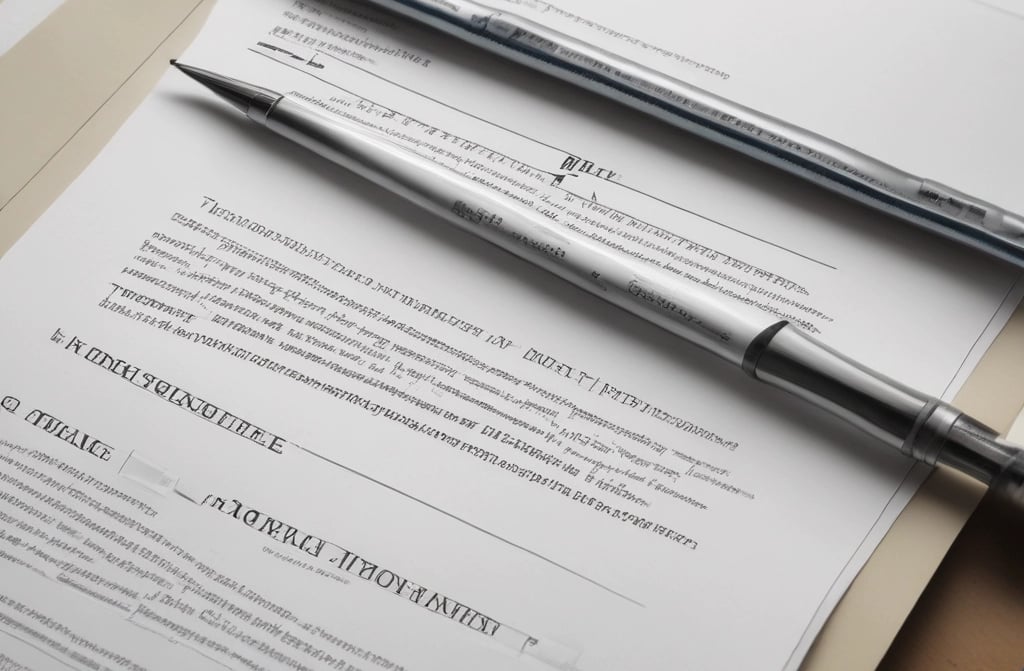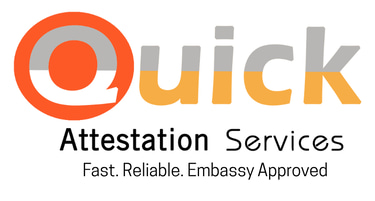Easy Certificate Attestation Services
Discover hassle-free certificate attestation services for educational, personal, and commercial needs. Get your documents verified quickly and efficiently with our expert assistance.
9/5/20257 min read


Introduction to Certificate Attestation
Certificate attestation is an essential process that involves verifying the authenticity of documents. This procedure is crucial for various contexts, including employment opportunities, immigration processes, and legal matters. The primary goal of certificate attestation is to ensure that the certificates presented hold true to their stated validity and origin before they are accepted in another country or jurisdiction.
There are three main types of certificates that typically require attestation: educational, personal, and commercial. Educational certificates include degrees, diplomas, and transcripts, which are often necessary for further studies or employment abroad. Personal documents such as birth certificates, marriage certificates, and death certificates may also require attestation, especially when applying for residency or citizenship in another country. On the other hand, commercial documents like business licenses, contracts, and financial statements also need to be authenticated to facilitate international business operations.
The necessity for certificate attestation lies in its ability to prevent fraud and ensure legal compliance. Governments and institutions require attested documents to trust the legitimacy of foreign qualifications or relationships. For expatriates, employers often mandate attested educational qualifications to validate skills and thereby ensure that they meet specific job requirements. Similarly, personal documents may need validation for reasons such as applying for visas, where authorities want verified records of relationships or personal status.
As the world becomes increasingly interconnected, the importance of certificate attestation continues to grow. Each country has its own rules and regulatory bodies governing this process, necessitating a thorough understanding of the specific requirements applicable to each type of document. Thus, navigating the certificate attestation procedure is essential for anyone looking to travel, work, or settle in a foreign land.
The Process of Educational Certificate Attestation
Educational certificate attestation is a crucial process for individuals who wish to validate their degrees, diplomas, or other academic qualifications for various purposes, such as further education, employment, or migration. The attestation process can often seem daunting, but understanding the specific steps can simplify the experience considerably.
The first step in educational certificate attestation involves gathering all necessary documents. Typically, these documents include the original educational certificates, copies of the candidate’s passport, and sometimes a photograph, depending on the specific requirements of the country where the attestation is required. It is essential to verify the exact documentation demanded by the destination country to avoid any delays.
Next, the documents must be submitted to the appropriate authorities for attestation. The initial attestation generally occurs at the issuing institution, where the authenticity of the educational certificates is confirmed. Afterward, the certificates must be authenticated by relevant educational bodies or governmental authorities, such as the Ministry of Education or a designated agency responsible for such verifications. In many cases, the final step involves verifying the documents at the embassy or consulate of the country where the individual intends to use the certificates.
Timelines for the attestation process can vary significantly. Generally, the entire procedure may take anywhere from a few days to several weeks, depending on factors such as the complexity of verification and regional bureaucratic processes. To ensure a smooth experience, it is advisable to start the attestation process early, allowing adequate time for any unforeseen delays. Additionally, utilizing the services of professional attestation agencies can further streamline the process, ensuring that all requirements are met accurately.
Understanding Personal Certificate Attestation
The process of personal certificate attestation is essential for various legal, educational, and professional purposes. Personal certificates encompass a range of vital documents, including birth certificates, marriage certificates, and divorce decrees. Individuals often seek attestation for these documents to validate their authenticity and to facilitate their acceptance in foreign jurisdictions or during legal processes. Such verification is particularly important when moving abroad, applying for jobs, or enrolling in educational institutions.
Personal certificates are typically issued by relevant governmental institutions. For instance, birth certificates are issued by the vital statistics office or local government authorities, while marriage certificates are provided by marriage registries. The original authority plays a crucial role in maintaining accurate records, which adds legitimacy to the documents. However, these original documents may not always be recognized internationally without proper attestation, which is where the process becomes significant.
The attestation process for personal certificates usually involves multiple steps. Initially, the document must be verified by the relevant issuing authority. Once authenticated, it often requires further verification from the Ministry of External Affairs (MEA) and, depending on the destination country, the respective embassy or consulate. It is vital to gather all required documents and verify specific requirements ahead of time, as regulations may vary significantly between countries. For instance, some countries may require translation of documents or specific notarizations.
Individuals should also be aware of the timelines associated with the attestation process; it can range from a few days to several weeks, depending on the complexity involved. Adhering to the precise requirements specified by institutions is crucial to avoid unnecessary delays. Understanding these factors will help streamline the personal certificate attestation process, ensuring that essential documents are recognized and accepted wherever needed.
Navigating Commercial Certificate Attestation
Commercial certificate attestation is a critical process for businesses engaged in international trade, requiring adherence to specific documentation standards. Various documents, such as company registration certificates, memorandums of association, and business-related licenses, may necessitate attestation to validate their authenticity. This process serves multiple purposes, including ensuring that the documents meet legal requirements in foreign jurisdictions and facilitating smoother business transactions across borders.
The necessity of attestation for commercial certificates cannot be overstated. Many countries mandate the attestation of commercial documents to comply with local laws and regulations. This assures partners, clients, and regulatory bodies that the company is genuine and legally recognized. Furthermore, businesses looking to expand into international markets will often find that attestation is a prerequisite for operating lawfully abroad. Consequently, understanding the specific requirements of each country is essential for companies aiming to navigate potential barriers in international trade.
Different countries have distinct attestation procedures that businesses must follow. For example, while some nations may accept an original document with a simple notarization, others may require a series of verifications from multiple government authorities before granting their approval. Therefore, companies must invest time to research the attestation requirements specific to their destination country. Engaging a professional service that specializes in commercial certificate attestation can streamline this process significantly, ensuring that all necessary steps are properly adhered to, thereby reducing the risks of complications during business operations.
In conclusion, effective navigation of commercial certificate attestation is essential for any business intending to participate in international markets. Understanding individual country requirements and ensuring compliance with local laws can foster smoother transactions and successful international engagements.
Challenges in Certificate Attestation
Certificate attestation is a vital process for both individuals and businesses seeking to validate their documents for various purposes, such as employment, immigration, or business transactions. However, this process often comes with numerous challenges that can hinder its effectiveness and efficiency. One of the most prevalent issues faced during certificate attestation is the delays in document verification. Many individuals find that the required verification procedures can take longer than expected, causing frustration and extending timelines unnecessarily. Such delays may stem from bureaucratic inefficiencies, incomplete documentation, or even logistical issues within the relevant authorities.
Another significant challenge arises from the varying regulations and requirements in different countries. Each nation has its unique legal framework for document verification, and understanding these differences can be overwhelming for those unfamiliar with international procedures. As a result, individuals and businesses may inadvertently submit incorrect documents, leading to further complications and additional delays. Moreover, staying updated on changes in regulations is essential, as these can shift quickly, impacting the attestation process.
Additionally, the prevalence of fraudulent documentation poses a serious risk. Unscrupulous individuals may attempt to submit false documents, which can lead to severe consequences for both the applicant and the recipient of the documents. This risk emphasizes the importance of thorough verification and utilizing reputable services that specialize in certificate attestation. By choosing reliable professionals, individuals and businesses can mitigate the risks associated with document fraud and ensure a smoother process.
In conclusion, navigating the challenges of certificate attestation requires careful planning and a thorough understanding of the relevant regulations. By being aware of potential delays, familiarizing oneself with international requirements, and utilizing trusted services, one can significantly enhance the likelihood of a successful verification process.
How to Simplify the Attestation Process
Certificate attestation can often appear daunting due to the varying requirements and processes involved across different jurisdictions. However, through strategic planning and the use of professional services, individuals can simplify this process significantly. The first step towards easing the attestation journey is engaging with credible attestation services. These professionals possess in-depth knowledge of the attestation process, ensuring that the documentation is handled correctly and promptly. By opting for their services, certificate holders can alleviate the stress associated with navigating bureaucratic hurdles alone.
Another crucial aspect of simplifying the attestation process involves thorough preparation of necessary documentation ahead of time. Individuals should compile all relevant certificates and supporting documents well before the attestation is required. In particular, checking for photocopies of important documents, identity proofs, and other necessary papers ensures that everything is in order. This preemptive strategy helps prevent delays that can arise from missing or incorrect documentation, fostering a smoother attestation experience.
Understanding the specific attestation requirements of the destination country is equally vital. Each nation has its own unique criteria and procedures for document verification, which may change over time. Keeping informed about these updates can save significant time and effort in the attestation process. This diligence can include visiting government and embassy websites for the most current information or consulting with professionals who specialize in international certificate attestation. With awareness in hand, individuals can prepare their documents accordingly, ensuring compliance with each country's regulations.
By implementing these practical tips—utilizing professional services, preparing documentation in advance, and staying informed about requirements—individuals can navigate the complexities of certificate attestation more efficiently. Empowering oneself with knowledge allows for a more streamlined and less stressful experience, ultimately demystifying a process that many find intimidating.
Conclusion and Summary of Key Takeaways
In summary, certificate attestation plays a crucial role in validating educational, personal, and commercial documents, particularly in today's interconnected global environment. The process not only instills trust but also acts as a prerequisite for various applications such as higher education, employment, and legal matters. Throughout the blog post, we have explored the distinct nuances involved in attesting different types of documents, highlighting the steps needed to ensure a smooth experience.
We discussed the importance of understanding the requirements for each document type, whether it be an academic certificate, marriage certificate, or business license. Familiarizing oneself with domestic and international attestation processes can significantly mitigate uncertainties and potential challenges. This knowledge empowers individuals and businesses alike to navigate the complexities of the attestation process with confidence.
Moreover, we emphasized that reaching out to accredited attestation service providers can greatly streamline the process and save valuable time. These professionals are well-versed in the specific regulations and protocols for various jurisdictions and can assist in avoiding common pitfalls. Understanding the legal implications of unverified documents remains paramount. Certificate attestation not only establishes authenticity but also safeguards the interests of the concerned parties involved.
Ultimately, being proactive in understanding and approaching the certificate attestation process is essential for those who seek to fulfill their educational, personal, or commercial objectives. By recognizing the significance of attestation and taking the necessary measures to ensure compliance, readers can turn what might otherwise be a daunting task into a straightforward and manageable experience. Engaging with this critical aspect of documentation will undoubtedly pave the way for future opportunities and success.
